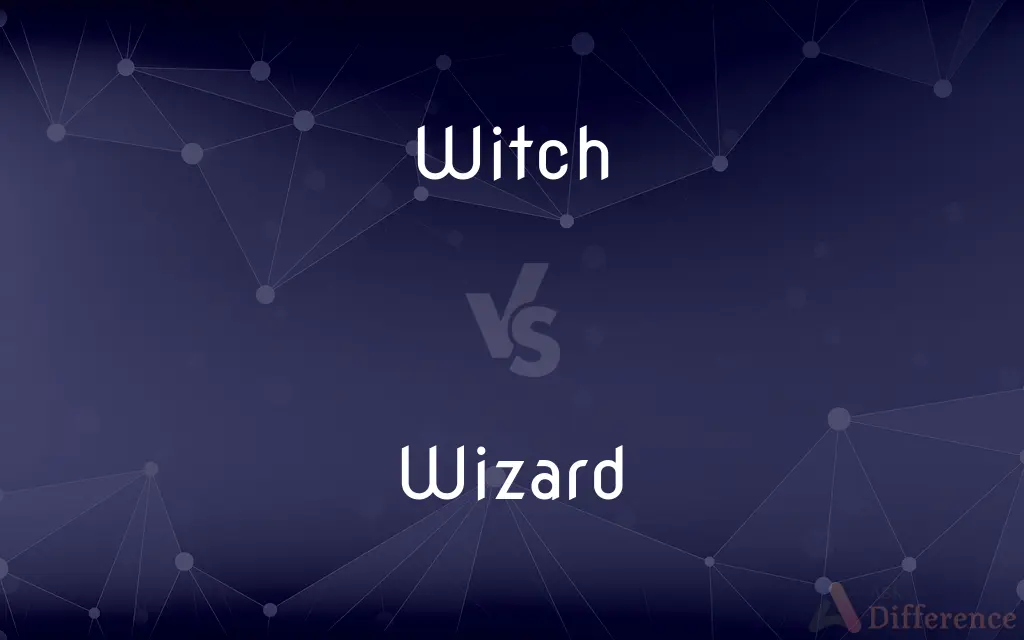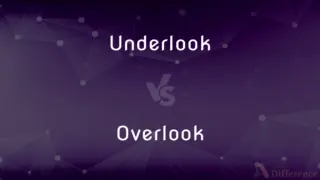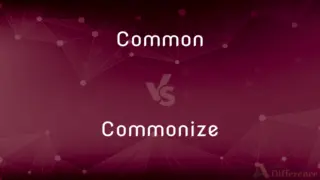Witch vs. Wizard — What's the Difference?
By Tayyaba Rehman — Updated on October 5, 2023
Witch generally refers to a person, typically a woman, practicing sorcery, often with a negative connotation. Wizard usually pertains to a man skilled in magic, often depicted as wise and benevolent.

Difference Between Witch and Wizard
Table of Contents
ADVERTISEMENT
Key Differences
Witches, often women, are frequently portrayed in folklore and literature as engaging in sorcery and spellcraft, sometimes with a malevolent intent. On the contrary, wizards, typically male, often showcase a wisdom and skill in magic, usually utilizing their powers for knowledge and aiding others in fantasy contexts.
In certain historical periods, witches were perceived as evildoers, and witch trials were conducted to prosecute, often women, for witchcraft, implying a societal fear and skepticism towards them. Wizards have commonly been mythologized as benevolent beings, assisting heroes in their quests and serving as wise mentors in various tales.
Witches have been symbolized with classic icons such as brooms, cauldrons, and black cats, often illustrating a connection to the supernatural and sometimes malevolence. Wizards are often associated with staffs, beards, and robes, symbolizing wisdom, authority, and mastery over magical arts.
In children's stories and fairy tales, witches are frequently antagonists, wielding their powers to enact curses or create obstacles for protagonists. Wizards, however, often appear as knowledgeable guides or helpers, employing their magic to assist or provide crucial advice.
Witches in contemporary media might be depicted with more nuance, exploring both dark and light aspects of witchcraft and magic. Similarly, modern portrayals of wizards can explore varied character dimensions, venturing beyond the archetypal wise old man to display a spectrum of characteristics and moral complexities.
ADVERTISEMENT
Comparison Chart
Gender Association
Predominantly female
Predominantly male
Connotation
Historically negative, may involve malevolence
Often positive, associated with wisdom
Cultural Perception
Often associated with evil or mischief
Frequently seen as benevolent and wise
Typical Role in Stories
Often an antagonist
Often a mentor or positive guide
Common Symbols
Broom, cauldron, black cat
Staff, beard, robe
Compare with Definitions
Witch
A woman thought to have magical powers, especially evil ones.
The villagers feared the witch who lived in the isolated cottage.
Wizard
A very clever or skillful person.
He's a financial wizard, capable of predicting market trends with uncanny accuracy.
Witch
A practitioner of modern witchcraft.
As a witch, she celebrates the solstices and equinoxes with special rituals.
Wizard
A computer program or script used to simplify complex operations.
I used a setup wizard to install the software on my computer.
Witch
A charming or alluring girl or woman.
The young witch enchanted everyone with her radiant smile.
Wizard
An ancient sage or mage often depicted with a beard and robe.
The ancient wizard shared prophetic visions of the future with the king.
Witch
One who is credited with usually malignant supernatural powers.
In the play, a witch curses the protagonist to a life of misery.
Wizard
A character in fantasy literature and films who performs magic.
Gandalf, the wizard, played a crucial role in The Lord of the Rings.
Witch
A person, particularly a woman, claiming or popularly believed to possess magical powers and practice sorcery.
The witch was rumored to concoct potions that could heal or harm.
Wizard
(in legends and fairy tales) a man who has magical powers.
Witch
A person, especially a woman, claiming or popularly believed to possess magical powers and practice sorcery.
Wizard
A help feature of a software package that automates complex tasks by asking the user a series of easy-to-answer questions.
Witch
A believer or follower of Wicca; a Wiccan.
Wizard
Wonderful; excellent
How absolutely wizard!
I've just had a wizard idea
Witch
(Offensive) An old woman considered to be ugly or frightening.
Wizard
One who practices magic; a sorcerer or magician.
Witch
A woman considered to be spiteful or overbearing.
Wizard
A skilled or clever person
A wizard at math.
Witch
(Informal) A woman or girl considered to be charming or fascinating.
Wizard
(Archaic) A sage.
Witch
One particularly skilled or competent at one's craft
"A witch of a writer, [she] is capable of developing an intensity that verges on ferocity" (Peter S. Prescott).
Wizard
Chiefly British Slang Excellent.
Witch
To work or cast a spell on; bewitch.
Wizard
(Archaic) Of or relating to wizards or wizardry.
Witch
To cause, bring, or effect by witchcraft.
Wizard
Someone, usually male, who uses (or has skill with) magic, mystic items, and magical and mystical practices.
You're a wizard, Harry
Witch
To use a divining rod to find underground water or minerals; dowse.
Wizard
One who is especially skilled or unusually talented in a particular field.
He was a financial wizard, capable of predicting the movements of the stock markets.
Witch
A person who practices witchcraft.
Wizard
(computing) A computer program or script used to simplify complex operations, often for an inexperienced user.
Use the "Add Network Connection" wizard to connect to a network in a series of simple steps.
Witch
(now usually particularly) A woman who is learned in and actively practices witchcraft.
Wizard
(Internet) One of the administrators of a multi-user dungeon.
Witch
An ugly or unpleasant woman.
I hate that old witch.
Wizard
(obsolete) A wise man; a sage.
Witch
One who exercises more-than-common power of attraction; a charming or bewitching person.
Wizard
(internet slang) A virgin over the age of 30.
Witch
One given to mischief, especially a woman or child.
Wizard
Fine, superb (originally RAF slang).
Witch
(geometry) A certain curve of the third order, described by Maria Agnesi under the name versiera.
Wizard
(intransitive) To practice wizardry.
Witch
The storm petrel.
Wizard
(transitive) To conjure.
Witch
Any of a number of flatfish:
Wizard
A wise man; a sage.
See how from far upon the eastern roadThe star-led wizards [Magi] haste with odors sweet!
Witch
Glyptocephalus cynoglossus (Torbay sole), found in the North Atlantic.
Wizard
One devoted to the black art; a magician; a conjurer; a sorcerer; an enchanter.
The wily wizard must be caught.
Witch
Lepidorhombus whiffiagonis (megrim), found in the North Atlantic.
Wizard
Enchanting; charming.
Witch
Arnoglossus scapha, found near New Zealand.
Wizard
Haunted by wizards.
Where Deva spreads her wizard stream.
Witch
The Indomalayan butterfly Araotes lapithis, of the family Lycaenidae.
Wizard
Someone who is dazzlingly skilled in any field
Witch
A cone of paper which is placed in a vessel of lard or other fat and used as a taper.
Wizard
One who practices magic or sorcery
Witch
(intransitive) To dowse for water.
Wizard
Possessing or using or characteristic of or appropriate to supernatural powers;
Charming incantations
Magic signs that protect against adverse influence
A magical spell
'tis now the very witching time of night
Wizard wands
Wizardly powers
Witch
To practise witchcraft.
Wizard
A man who is skilled in magic or who has magical powers.
The wizard cast a spell to protect the village from harm.
Witch
(transitive) To bewitch.
Witch
A cone of paper which is placed in a vessel of lard or other fat, and used as a taper.
Witch
One who practices the black art, or magic; one regarded as possessing supernatural or magical power by compact with an evil spirit, esp. with the Devil; a sorcerer or sorceress; - now applied chiefly or only to women, but formerly used of men as well.
There was a man in that city whose name was Simon, a witch.
He can not abide the old woman of Brentford; he swears she's a witch.
Witch
An ugly old woman; a hag.
Witch
One who exercises more than common power of attraction; a charming or bewitching person; also, one given to mischief; - said especially of a woman or child.
Witch
A certain curve of the third order, described by Maria Agnesi under the name versiera.
Witch
The stormy petrel.
Witch
A Wiccan; an adherent or practitioner of Wicca, a religion which in different forms may be paganistic and nature-oriented, or ditheistic. The term witch applies to both male and female adherents in this sense.
Witch
To bewitch; to fascinate; to enchant.
[I 'll] witch sweet ladies with my words and looks.
Whether within us or withoutThe spell of this illusion beThat witches us to hear and see.
Witch
A female sorcerer or magician
Witch
A being (usually female) imagined to have special powers derived from the devil
Witch
An ugly evil-looking old woman
Witch
Cast a spell over someone or something; put a hex on someone or something
Common Curiosities
Are "witch" and "wizard" gender-specific terms?
Traditionally, "witch" is female and "wizard" male, but modern uses can be gender-neutral.
Can "witch" have a negative connotation?
Yes, "witch" has been used negatively, especially in historical contexts like witch trials.
Is "wizard" typically associated with positive attributes?
Often, yes. Wizards are frequently portrayed as wise and powerful.
Can "witch" also imply a skilled or enchanting woman?
Yes, "witch" can metaphorically suggest an alluring or captivating woman.
Can "witch" imply malevolence in folklores?
Often yes, in many folktales, witches can embody malevolent or harmful forces.
Can "wizard" imply a high level of skill in a non-magical context?
Yes, "wizard" can suggest exceptional skill, e.g., a “computer wizard.”
Is a "witch" always related to supernatural powers?
Commonly, but not always. "Witch" can refer to actual historical figures or metaphorical contexts.
Is "witchcraft" always associated with negative magic?
No, witchcraft can be neutral, positive, or negative, depending on the context.
Do "wizards" always depict old age?
No, wizards can be of any age, though they’re often portrayed as elderly.
Can "wizard" be used in casual conversation to imply cleverness?
Yes, e.g., "You fixed it? You’re a wizard!"
Are "wizards" usually solitary in mythologies?
Not necessarily. Wizards can be solitary or part of societal structures in various narratives.
Does "witch" always indicate magical abilities?
Often yes, but it can also metaphorically indicate a malicious or unpleasant person.
Are “wizardry” and “sorcery” interchangeable?
Largely, yes, but "wizardry" may imply wisdom or benevolence, while "sorcery" might have darker connotations.
Can “wizard” be used in tech jargon?
Yes, in technology, a "wizard" refers to a user-friendly interface guiding users through a process.
Are "witches" predominantly female in most cultures?
Predominantly, yes, but there are cultural instances of male witches.
Share Your Discovery

Previous Comparison
Underlook vs. Overlook
Next Comparison
Common vs. CommonizeAuthor Spotlight
Written by
Tayyaba RehmanTayyaba Rehman is a distinguished writer, currently serving as a primary contributor to askdifference.com. As a researcher in semantics and etymology, Tayyaba's passion for the complexity of languages and their distinctions has found a perfect home on the platform. Tayyaba delves into the intricacies of language, distinguishing between commonly confused words and phrases, thereby providing clarity for readers worldwide.














































